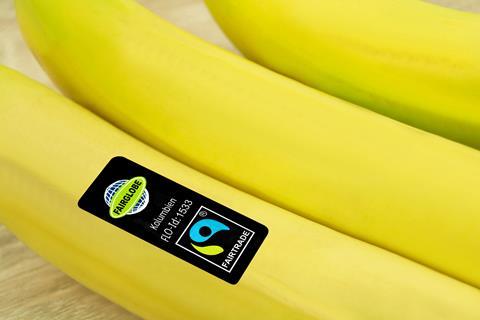’Driving the fairness agenda’ highlights the achievements of the Fairtrade system and showcases progress on key issues
Fairtrade International released its 2023 annual report during its general assembly today (19 June).

It showcased the organisation’s priorities and milestones, including progress on sustainability issues such as tackling deforestation, human rights, and living incomes.
Entitled ’Driving the fairness agenda’, the report highlighted the achievements of the Fairtrade system and its partners in the past year, such as its programmes and initiatives that deepen benefits for more than 2m farmers and workers from 68 countries around the globe.
“We are living in a rapidly changing world. Whether it’s related to climate, conflict, cost of living, or new regulations, we are all being called on to adapt and to act,” said Sandra Uwera Murasa, global CEO, and Melissa Duncan, executive director of Fairtrade International in the report’s foreword.
”Initiatives that are supposed to protect people and planet – for instance, a focus on deforestation and human rights – have good intentions, but often lead to more burden and expense for farmers and workers, simply to maintain market access.
”Amidst all the crises and well-intentioned initiatives, there is an increasing call for collective action from all our stakeholders – businesses, producers, policymakers and consumers – to drive solutions together,” they added. “This has been at the heart of our work over the past 12 months.”
Fairtrade reported on its first strategic priority of shifting the balance of power to farmers and workers, including developing pathways to decent and sustainable livelihoods, building resilience to climate change, reinforcing human and environmental rights, and supporting women and young people as leaders.
For example, Fairtrade set its first Living Wage Reference Prices for banana workers, as part of an updated pathway to living wages through which companies can make sure they are contributing their fair share.
When it came to growth and innovation, Fairtrade said it strengthened its existing relationships, developed markets in new directions, and offered supply chain services that benefit producers and businesses.
In terms of market access, one example was the Fairtrade Sustainable Banana project, funded by the French Development Agency and Carrefour.
The project supported Peruvian and Dominican producer organisations to increase their market competitiveness and resilience by boosting climate-friendly farming practices (increased from 42 to 80 per cent over the course of the project), and improved their yields by 19 per cent.
Fairtrade producers have also developed and marketed their own brands locally, as well as raising consumer awareness about the Fairtrade brand.
On the advocacy and citizen engagement front, Fairtrade addressed a range of interconnected issues, including living incomes as part of corporate due diligence, deforestation, and climate resilience.
It campaigned for the European Union Corporate Social Responsibility Due Diligence Directive to include living incomes, living wages, and responsible purchasing practices, which the passage of the directive earlier this year reflected.
Fairtrade said that in the area of digitalisation for fairer supply chains, the annual report described a number of data-driven platforms and services.
The launch of the Fairtrade banana dashboard in 2023 meant that producers and companies had a one-stop-shop to find information about specific origins, Fairtrade sales and Premium amounts, living wage data, research findings, and more.
Click here to access the 2023 Fairtrade International annual report



